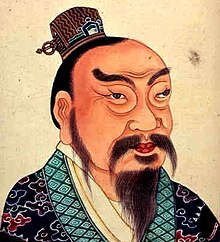Emperor Gaozu of Han, Liu Bang, Han Dynasty, Founding Emperor of Han, Chinese history, Ancient China, Early Han Dynasty, Rise to powerBattle of Gaixia, Xiang Yu, Liu Bang’s reign, Governance of Han Dynasty, Imperial reforms, Legacy of Emperor Gaozu, Confucianism in Han Dynasty, Gaozu’s conquests, Han Dynasty’s territorial expansion, Gaozu’s administrative policies, Han Dynasty’s stability, Succession of Emperor Gaozu’s descendants
Introduction: Emperor Gaozu of Han, born Liu Bang, stands as a towering figure in Chinese history, revered as the architect of the Han Dynasty and hailed for his pivotal role in shaping the destiny of China. This article delves into the multifaceted legacy of Emperor Gaozu, tracing his journey from humble beginnings to imperial glory and examining the profound impact of his reign on the course of Chinese civilization.
Read More: Unveiling the Legacy of Den: The Fourth King of Egypt’s First Dynasty
- Early Life and Rise to Power:
- Humble origins and upbringing in ancient China.
- Involvement in the rebellion against the Qin Dynasty.
- Ascension to power following the collapse of the Qin regime.
- Triumph over rivals, including Xiang Yu, in the struggle for dominance.
- Founding the Han Dynasty:
- Consolidation of power and establishment of the Han Dynasty.
- Implementation of administrative reforms to stabilize the realm.
- Promotion of Confucian principles and restoration of order after years of conflict.
- Governance and Administrative Reforms:
- Gaozu’s policies for governance and administration.
- Promotion of meritocracy and recruitment of talented officials.
- Standardization of laws and taxation to foster stability and prosperity.
- Military Campaigns and Territorial Expansion:
- Gaozu’s military strategies and conquests.
- Expansion of Han territory through diplomatic and military means.
- Establishment of the Silk Road trade routes, facilitating cultural exchange and economic growth.
- Cultural and Intellectual Legacy:
- Patronage of Confucianism and promotion of learning.
- Encouragement of literary and artistic endeavors.
- Promotion of cultural assimilation and integration within the empire.
- Enduring Influence and Legacy:
- Gaozu’s impact on subsequent Chinese dynasties and rulers.
- Legacy of stability and prosperity during the Western Han period.
- Continuation of Han traditions and institutions throughout Chinese history.
Conclusion: Emperor Gaozu of Han emerges from the annals of history as a transformative figure whose leadership laid the foundation for a golden age in Chinese civilization. Through his vision, resilience, and statesmanship, he not only united a fractured land but also set in motion a legacy of governance, culture, and prosperity that would endure for centuries to come. As we reflect on his remarkable journey, we gain insight into the enduring spirit of innovation and resilience that defines the rich tapestry of Chinese history.

